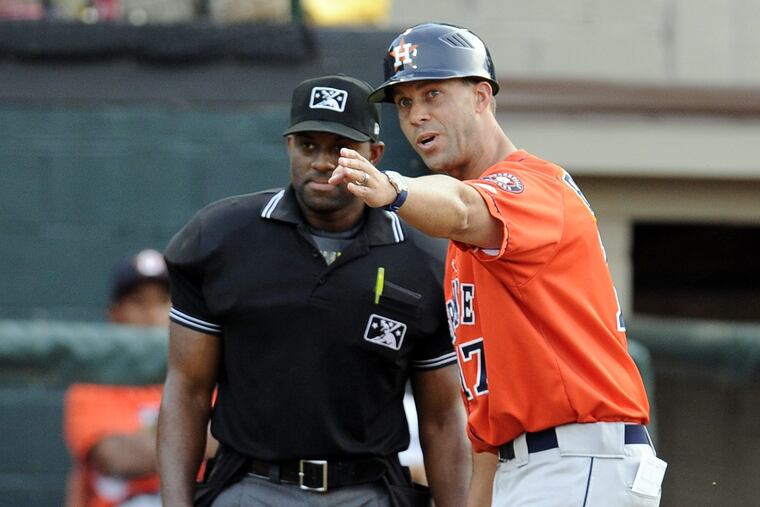Manny Machado or Bryce Harper would be nice, but Phillies need to develop their own talent | David Murphy
The most important acquisition of the Phillies offseason may have already happened. In an increasingly egalitarian baseball economy, the perennial contenders are those who are able to find and refine talent on the ground floor.

The most important acquisition of the Phillies offseason may have already happened. The past few months have been a showcase for aspiring financial planners who know exactly where John Middleton should park his money. Invariably, this investment advice focuses on one of the most top-heavy crops of free agents in recent memory. At the moment, we seem to be in the midst of a bout of the sort of last-second contrarianism that tends to occur when people run out of things to speculate about. Bryce Harper isn't a winner. Manny Machado blows bubbles while running the bases.
At some point in the next three or four months, there will come a day or two when we realize just how nitty these pickings always were. In MLB history, only 17 players entered their 26-year-old season with at least 175 home runs and an OPS over .800. Two of them will be free to sign with the highest bidder within the next few weeks. They will get paid, and the Phillies will be nothing other than fortunate if they are the team who ends up paying one or both.
That said, there's no guarantee that Middleton's money will end up being the right color green. You'd be ignoring all sorts of history to consider the Phillies as the betting favorites to land either one of the two preeminent hitters on the market, particularly once you realize that destination franchises such as the Yankees and Dodgers have more than enough payroll flexibility to match whatever price is feasible for a team such as the Phillies to pay. That's not to say that it is a long shot. It's just not the kind of certainty that for which you draw blueprints.
Which brings us to Josh Bonifay. When the Phillies announced in September that Joe Jordan would not return in his role as farm director, it was a tacit acknowledgement of a reality that has become increasingly clear to anybody who has followed the ongoing rebuild. Simply put, the farm has proved awfully fallow in recent years.
With the hiring of Bonifay last week to step into Jordan's former role, the Phillies are hoping to revamp one of the most critical arteries in any organization's pipeline of talent. The selection of the 40-year-old coach and instructor to oversee minor league player development is in many ways a nod to the successes of his former employer. During his tenure in the Astros' minor-league system, Bonifay served as an important cog in an operation that yielded a remarkable bounty of talent that propelled Houston to back-to-back 100-win seasons and the 2017 World Series title. In many ways, the Astros' success over the last couple of seasons has underscored the challenges that the Phillies face.
While it is true that the Astros wouldn't be where they are without some shrewd roster maneuvering at the big-league level — Justin Verlander and Gerrit Cole were both high-profile trade acquisitions — it is also true that the foundation of their team is a quintet of stars who developed on their watch. Three of those players — 25-year-old Carlos Correa, 24-year-old Alex Bregman, and 29-year-old George Springer — were first-round draft picks who followed a fairly linear path from high-profile prospects up through the ranks of the development system and into the major leagues.
The trajectories of the Astros' crop of blue-chippers are the sorts of things that the Phillies have struggled to replicate with their own amateur talent.
When the 2019 free-agent class first appeared on people's radars, it was assumed to be the place where the Phillies would find the last piece or two to round out a lineup that would be anchored by some combination of J.P. Crawford, Cornelius Randolph, Maikel Franco, Roman Quinn, and Carlos Tocci. On the pitching side of things, high-pedigree arms such as Jake Thompson and Mark Appel seemed like decent bets to make some sort of contribution to the big-league rotation.
At the moment, none of those names looks likely to fill the sorts of roles that Bregman, Correa, Springer and pitcher Lance McCullers Jr. fill for the Astros. Casting the darkest pall over the Phillies' immediate future are the 2018 struggles of Crawford and fellow Top 100 prospect Scott Kingery. In 138 plate appearances, Crawford hit just .214 with a .712 OPS, a line that is actually inflated by the fact that it came almost exclusively against right-handed pitching. Meanwhile, Kingery was one of the least productive hitters in the majors this season, posting a .226/.267/.338 batting line, with 126 strikeouts in 452 at-bats.
There have been some successes, most notably Aaron Nola and Rhys Hoskins. But the simple truth is that the Phillies will be hard-pressed to match the success of teams such as the Astros, Cubs and Dodgers if they do not get more out of their homegrown talent. Money can buy a lot of things. There's no doubt that it can help win a championship. But in an increasingly egalitarian baseball economy, the perennial contenders are those who can find and refine talent on the ground floor. If Bonifay proves to be someone who can oversee that sort of system, the offseason may already have been won.